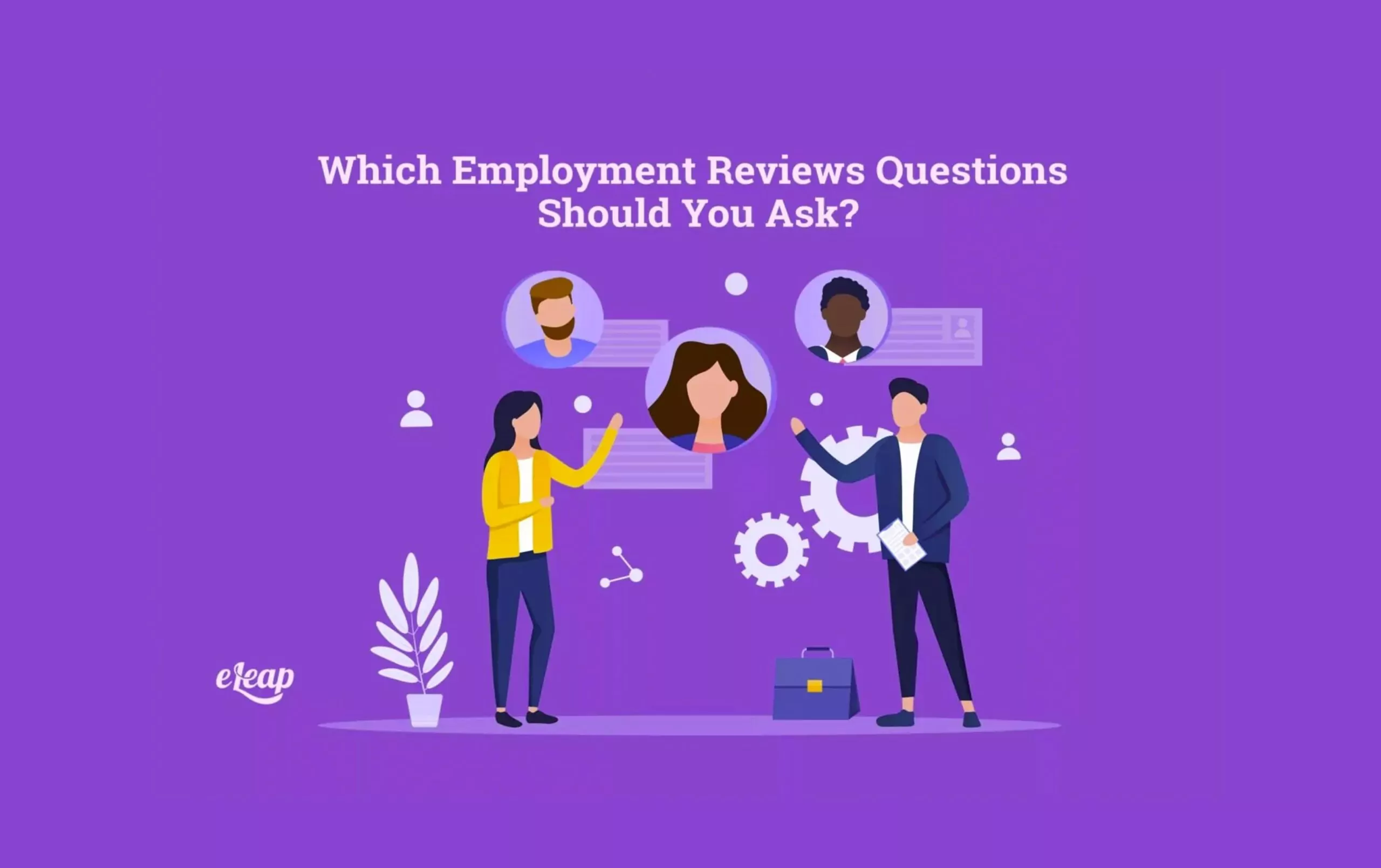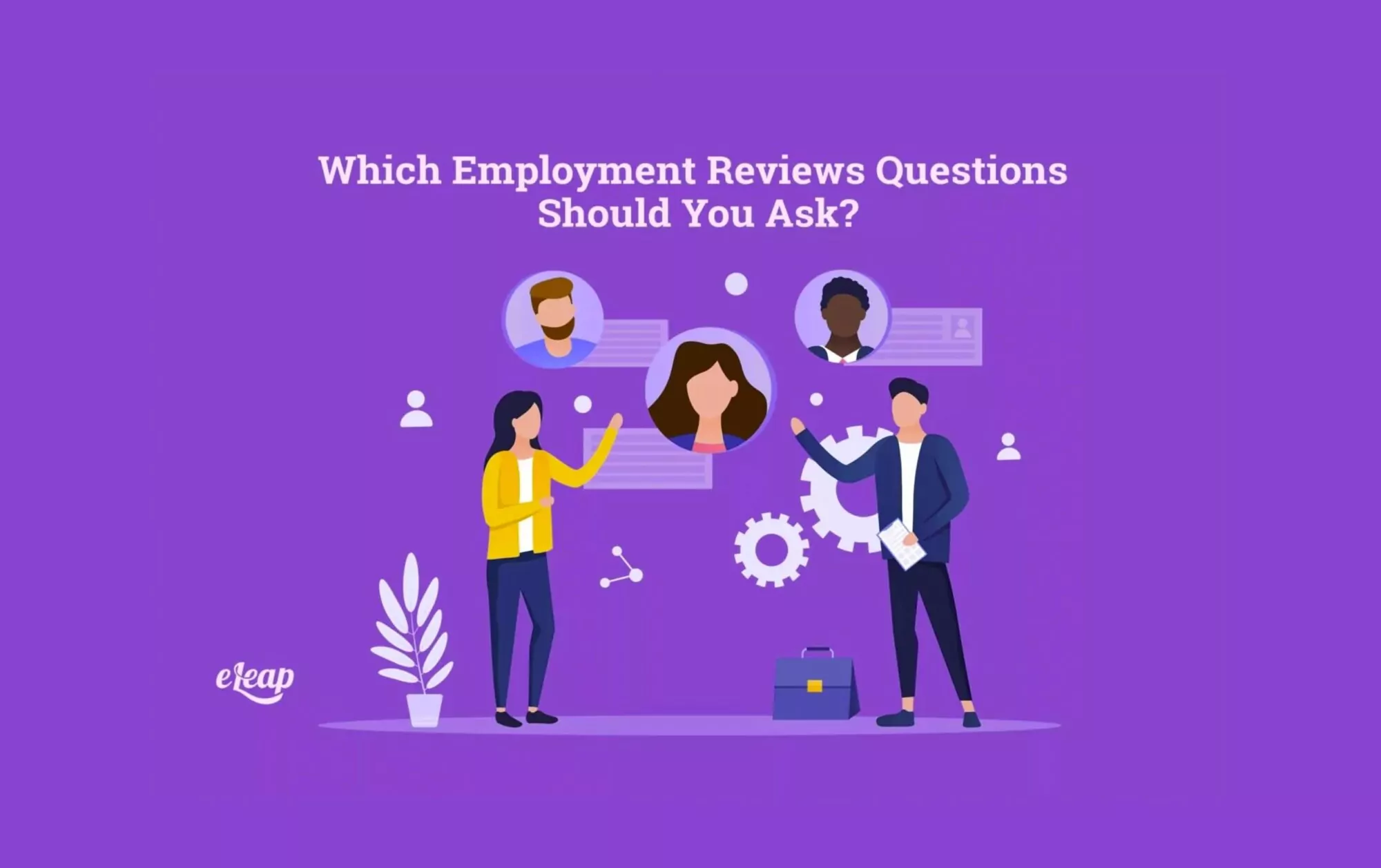Which Employment Reviews Questions Should You Ask?

During employment reviews, questions are the most important thing to have ready. Having a conversation about performance is crucial. Adding in the right questions lets you know more about an employee, such as where they fit on a team, whether they align with the company mission, and what development they might need.
The best performance reviews questions are going to provide insight into team performance. However, doing that means that managers need a structure to get things off the ground. Asking the right questions is a huge part of that.

This article will go into employment reviews questions that you can use to get the information you want. You’ll get all the vital answers you need to make great decisions for your team. This can even help the company as a whole.
Choosing the Right Employment Reviews Questions
Having a list of questions is good. However, no structure can also make it hard to ensure you ask about all the most important things.
Instead, think about breaking employment review questions into categories. This lets you easily construct a conversation while touching on important topics.
Another thing to keep in mind is how many questions you ask. Too few, and it might be hard to spot potential issues. Make sure there are enough to get insights into employee performance and future goals.
Steps to Prepare to Give Employment Reviews Questions
The main thing you want to do to prepare to give employment reviews questions is to set goals. You should know what you are trying to achieve. In many cases, there are two goals to employment reviews:
- Evaluate team member performance over a certain amount of time to make relevant business decisions.
- Give workers feedback and share areas of improvement for professional development.
Think about these goals as you create employment reviews questions. It will provide the best chance of giving you the information you need.
Employment Reviews Questions About Overall Performance
The best way to start is by finding out how a worker feels about their performance overall. This feedback lets you know what makes team members feel proud of themselves. It can also help you get an idea of how they feel they’re doing.
It’s also a good idea to delve into the goals a worker has met as well as goals they may have fallen short with. Knowing what motivates them and what working environment works for them is also important.
What motivates one person on the team might not do the same for the rest of the team members. It’s essential to understand what motivates each person as an individual. This is the best way to drive results across the entire team.
Some questions may be unneeded or not give the information you want. This should be avoided when possible.
For instance, “how do you feel about your performance” or “how did you do meeting goals” may not give you new insights.
Instead, make sure every question gives you valuable information to do your job. Consider the wording you use and what information the answers will provide.
Some of the questions you might want to add to the list include the following:
- Which accomplishments from the past six months are you most proud of?
- Which of your goals did you meet? Which did you fall short of meeting?
- What gives you the motivation to do your work?
- What could be done to make your job more enjoyable?
- Which working conditions help you be most productive?
- What do you want to accomplish over the next year?
Employment Reviews Questions About Strengths
Having questions related to employee strengths is essential. This lets you better understand a worker’s strengths and skills. In some cases, you may find a way to help them grow that adds value to the organization as a whole.
However, the way these questions are asked is also important. Avoid vague questions. You also want to reword any questions that can be answered with a simple yes or no.
Instead of asking, “what do you think your key strengths are” or “do you think your strengths are used well in the role you are in,” dig a little deeper.
Make the questions as specific as you can and let the employee answer in an open way. This removes the chance that someone will answer with only a word or a phrase. You want to make sure that the questions you ask give details.
Below are a few of the questions that might work for you:
- Which strengths help you do your job to the best of your ability?
- What types of projects on the team give you the most inspiration?
- Which skills make you most effective and efficient in your role?
Employment Reviews Questions About Relationships
Employment reviews questions about relationships are also essential. These can give you insight into whether an employee feels like part of the time. It can also delve into whether they communicate productively and comfortably and work well with team members and leaders.
As with the section above, you want to think through every word in the questions you ask. Try to avoid questions that don’t give you any information you don’t already have.
For example, don’t ask, “has anyone given you feedback recently” or “are there any changes you want to make in your relationships with managers.”
Instead, come from several perspectives as you create the best employment reviews questions. There’s nothing wrong with having a large list of questions like this. It helps you express that you want to hear from your team members and understand how things are going on a team.
Some questions that can give you a good start here include:
- In what way do you prefer to receive feedback?
- Have you been provided with sufficient valuable feedback this year?
- How would you describe your relationship with your manager? With your team?
- If you were a manager, what would you do differently?
- What hurdles or roadblocks are in place that makes it stop you or make it a challenge to meet your goals?
Employment Reviews Questions About Areas of Improvement
To manage performance and employee development, you need to know the weaknesses of team members. Questions should determine what issues and gaps keep workers from doing their best. Vague and closed questions are just as problematic here as in previous sections.
For example, questions like “what do you plan to do differently in the next six months” or “do you lack something that would help you do your best work” may not be the right choices.
Instead, employment reviews questions about weaknesses should let workers talk about their setbacks and successes. Bring up the tasks and projects that excited them as well as abilities and skills they want to master.
Creating a professional development plan with your team members can also factor into this. You can give them ideas for improvement areas based on company strategies and goals.
Several questions below are a great choice for this section of the employment review:
- What issues did you run into this year, and why did they happen?
- What do you plan to do differently to avoid these issues going forward?
- What would you like to focus on over the next six months to develop and grow?
- What can we provide you with to help with your professional growth?
Employment Reviews Questions About Future Growth
Knowing how things are going now is important. However, you also want to consider how to set things up for the future. You may want to choose some questions that relate to employee future growth as you create your list.
As with all the sections we’ve already talked about, each question needs to offer value. Don’t go with the first question you think of if there might be another one that gives you better insight and information about your team members.
“What goals do you have for the future” and “where do you want to be five years from now” might be typical questions, but they have little value. Make sure your questions are organized to create clear and open answers about aspirations and goals.
Use the questions below to start building a set of your own that work for your team members:
- What do you think will be your biggest challenge next year? What have you done to prepare for the challenge?
- Do you think your own goals align with the company’s goals? If not, why is that?
- What position would you most like to obtain next at the company? What kind of new responsibilities would you have?
- Which growth opportunities would you enjoy exploring to reach that position?
In Conclusion
Management needs to hold employment reviews; questions that hit all the most important topics can help. Remember that the process of reviews is to help the company. Employees should be comfortable enough to provide you with honest answers to inquiries.
When you ask employment reviews questions that lead to conversation, the review process can be good for leaders and team members. Be constructive and non-judgmental to create an atmosphere that gives you the answers you need to succeed.
The eLeaP Performance Management Plan, which includes a continuous performance management system, provides organizations with powerful options to attract and retain high-caliber team members.